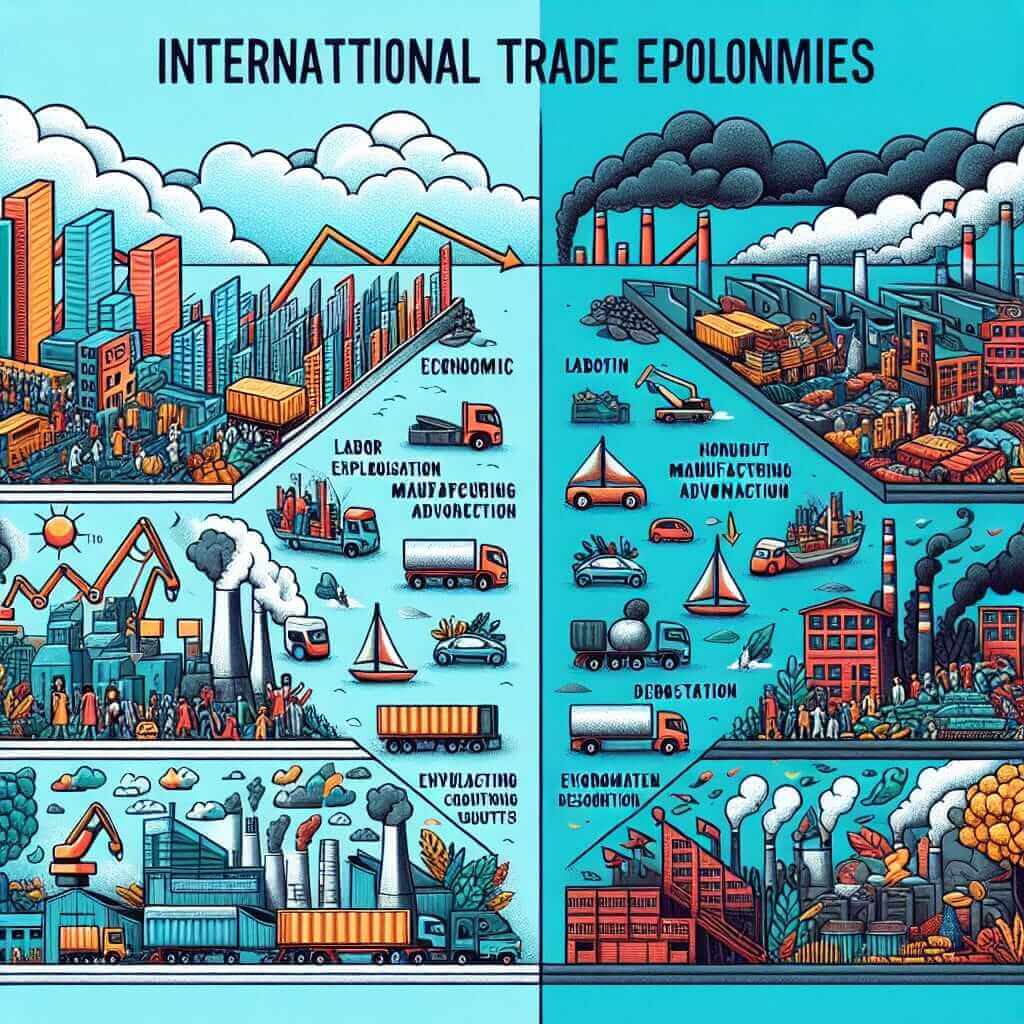Global trade policies significantly influence the social and economic landscapes of developing countries. These policies, often crafted by influential international organizations, determine how these countries access markets, manage their resources, and engage in global economic networks. In this article, we will look closely into the effects of global trade policies on developing nations and provide an IELTS Writing Task 2 practice question based on this topic.
Frequent Topic in IELTS
The theme of global trade policies and their impacts on developing countries frequently appears in IELTS Writing Task 2. It’s essential to comprehend these topics and articulate well-thought-out arguments.
Sample Questions
Here are some potential questions you might encounter in the IELTS Writing Task 2 exam:
- “Discuss the positive and negative effects of global trade policies on developing countries. Provide reasons for your answer and include any relevant examples from your own knowledge or experience.”
- “To what extent do you agree or disagree with the following statement: ‘Global trade policies are more beneficial to developed countries than to developing ones’?”
- “Analyze the role of international organizations in shaping global trade policies and their impact on developing countries.”
Detailed Breakdown
Selected Question for Analysis
For this exercise, we will address the first sample question: “Discuss the positive and negative effects of global trade policies on developing countries. Provide reasons for your answer and include any relevant examples from your own knowledge or experience.”
Analyzing the Question
The question asks for a discussion of both the positive and negative effects of global trade policies on developing countries. The candidate is required to provide balanced arguments, supported by reasons and relevant examples.
Sample Answer
Global trade policies have had a profound impact on developing countries, shaping their economic dynamics and societal structures. This essay will discuss the positive and negative effects of these policies.
On the positive side, global trade policies can stimulate economic growth in developing countries. By opening up markets, these nations can export their goods and services, leading to increased revenue and job creation. For example, Vietnam’s integration into the World Trade Organization (WTO) has significantly boosted its manufacturing sector, leading to economic development and poverty reduction. Additionally, these policies can facilitate technology transfer and improve access to foreign direct investment, which can help build infrastructure and enhance productivity.
However, there are also notable negative effects. One of the main challenges is the inequitable distribution of benefits. Global trade policies tend to favor developed countries, leaving developing nations at a disadvantage. For instance, agricultural subsidies in the European Union and the United States make it difficult for farmers in developing countries to compete, thus undermining their agricultural sectors. Moreover, reliance on exports can make these economies vulnerable to global market fluctuations, as seen during the 2008 financial crisis.

Furthermore, rapid economic liberalization often leads to the exploitation of labor in developing countries. Multinational corporations may take advantage of cheaper labor costs, subjecting workers to poor working conditions and low wages. The collapse of the Rana Plaza in Bangladesh in 2013, which highlighted unsafe working conditions in the garment industry, serves as a stark reminder of these risks.
In conclusion, while global trade policies can promote economic growth and development in developing countries, they can also lead to significant challenges, including economic vulnerability and labor exploitation. Policymakers must strive to create a more equitable global trade system that benefits all parties involved.
Word count: 294
Notes on Writing
Vocabulary and Grammar Considerations
- Vocabulary: Use formal and academic words such as “stimulate,” “integration,” “inequitable,” “liberalization,” and “vulnerability.” These words are suitable for IELTS Writing Task 2 and help in scoring higher in the Lexical Resource criterion.
- Grammar: Ensure varied sentence structures, including complex sentences and passive voice. For example, “Global trade policies can stimulate economic growth” and “Multinational corporations may take advantage of cheaper labor costs.” These structures show a wide range of grammatical ability.
Key Vocabulary
- Stimulate (verb) /ˈstɪmjʊˌleɪt/: To encourage development or increase activity.
- Integration (noun) /ˈɪntɪˌɡreɪʃən/: The process of combining or adding parts to make a unified whole.
- Inequitable (adjective) /ɪnˈɛkwɪtəbl/: Unfair, not equitable.
- Liberalization (noun) /ˌlɪbərəlaɪˈzeɪʃən/: The process of making laws, systems, or opinions less strict.
- Vulnerability (noun) /ˌvʌlnərəˈbɪlɪti/: The quality of being easily hurt or attacked.
Conclusion
Understanding the effects of global trade policies on developing countries is crucial for anyone preparing for the IELTS exam. This topic can appear in various forms, requiring you to present balanced arguments, supported by relevant examples. Practice with the questions provided, use advanced vocabulary, and ensure your grammar is impeccable to achieve a high score.
Additional Practice Topics
- “Evaluate the role of international trade organizations in promoting economic growth in developing countries.”
- “How do trade policies affect the environment in developing countries? Discuss with examples.”
- “Examine how changes in global trade policies impact small-scale industries in developing countries.”
By incorporating the strategies and insights provided in this article, you can enhance your essay writing skills and perform better in the IELTS Writing Task 2.